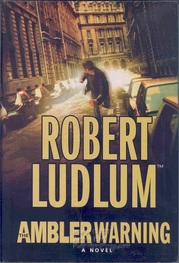Author: Robert Ludlum
ISBN: 978-0312990695
APA Style Citation
Ludlum, R. (2006). Ambler Warning. New York, New York: St. Martin’s Paperbacks.
Blog Contributor: Joseph Swope, PhD
Institution: Northwest High School
Germantown, Maryland
Website: http://swopepsych.com/
Email: [email protected]
| ambler_warning_activity.pdf |
This is a fiction book that explores and uses many of the concepts in a psychology class to hook the reader. Imagine Paul Ekman and Jason Bourne combined into one super spy.
People are communicating machines. More than any other trait it is our ability to communicate that defines us. While language is critical, what about the other messages, signals, and signs that help us read each other? Paul Ekman has spent his career showing us that our facial muscles are hardwired to our emotional processing modules of our brain. Most people have some ability to read the expressions and thus the emotions of others. What if there was a person who was so good at it, so intuitive, he could read others’ intentions before they consciously knew what they themselves were going to do?
Hal Ambler wakes up in a psychiatric hospital designed for former clandestine agents who are deemed too unstable to walk free with government secrets. Worse than the restraints and forced medications is the fact that he has no memory of himself or why he is trapped.
Using his gifts at reading peoples’ expressions, body language, and voice cues, Hal Ambler begins to unlock not only the cause of his confinement but also the reason for his amnesia. With each question answered more spring up until he doubts his name, his recently uncovered memories, and even his very sense of self. Did his amnesia come from a past event or was it forced upon him by those who don’t trust him? For a man who can read others effortlessly, having no knowledge of himself is torture in and of itself.
Note: While this was ghost written and probably not the best book with Ludlum’s name on it if you want a great read that might also hook your students, this book is fun.
Note: This book does not explicitly teach psychology to the reader. Still, for students who want to see what might be possible by applying concepts in their textbook, this book could be the hook that draws the into the curriculum.
Other Related Resources
http://www.paulekman.com/micro-expression-training/
https://en.wikipedia.org/wiki/Elizabeth_Loftus
Psychological Figures and Concepts
Paul Ekman
Brain Washing
Amnesia
Bottom-Up Processing
Deduction
Display Rules
Duchenne Smile
Emotional Control
Implanted Memory
Intuition
Involuntary Committal
Micro Expression
Mirror Neuron
Neuroleptic
Psychiatric Hospital
Retrograde Amnesia
Somatic Nervous System
Stockholm Syndrome
Top-Down Processing

 RSS Feed
RSS Feed